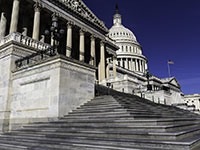
On January 14, 2015, the U.S. House of Representatives passed a bill that loosens certain Dodd-Frank requirements and reduces the scope of the SEC’s regulatory authority over certain private equity firms, small businesses, and emerging companies. The bill is part of a larger fight between Democrats and Republicans over the scope of Dodd-Frank and government oversight over financial institutions generally.
H.R. 37, otherwise known as the “Promoting Job Creation and Reducing Small Business Burdens Act,” was passed to, among other things, “make technical corrections to the Dodd-Frank Wall Street Reform and Consumer Protection Act,” allow small and emerging growth companies (as defined under the Securities Act of 1933) to access capital in public and private markets, and “reduce regulatory burdens.”
Several of the bill’s key provisions include:
- An extension of the deadline for banks subject to the Volcker Rule to dispose of collateralized loan obligations to July 21, 2019. The Federal Reserve already extended the original deadline of July 21, 2014 to July 21, 2016, and intends to grant an additional one-year extension to July 21, 2017.
- An exemption for certain merger and acquisition brokers from registering with the SEC, as required under Section 15(b) of the Securities Exchange Act of 1934.
- An exemption for certain emerging growth companies and issuers with less than $250,000,000 of annual gross revenues from the SEC’s requirement to use the Extensible Business Reporting Language – a computer language for the electronic transmission of business and financial data – for financial statements and reports filed with the Commission.
- A provision allowing certain emerging growth companies to omit from Form S-1 registration statements historical financial information typically required under federal regulations.
- A provision requiring the SEC to revise Regulation S-K – which sets forth the reporting requirements for various SEC filings used by public companies – within 180 days of the enactment of the Act.
- An increase of the threshold dollar amount of additional disclosures related to compensatory benefits plans, from $5,000,000 to $10,000,0000.
Taken together, the bill would subject fewer businesses to SEC oversight and reduce the regulatory requirements for other businesses. The bill, backed mainly by House Republicans, passed in a 271-154 vote. The bill is part of a larger effort by Republicans in the House and Senate to trim back Dodd-Frank. The White House has indicated its intent to veto the bill if it should pass the Senate.

